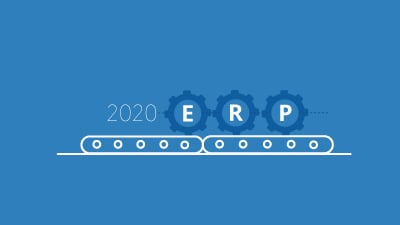How to Select the Right ERP Software in the Manufacturing Industry

While Acumatica ranks at the top of the list, the fact remains that there are many enterprise resource planning (ERP) software packages that all compete for your company's patronage. No one package is perfect, and each has unique strengths, weaknesses, and industry specializations.
Manufacturers have options including ERP systems designed for configure-to-order, engineer-to-order, make-to-stock, and other production methodologies.
This article provides a framework to understand manufacturing ERP options. Manufacturing methodology and industry profiles highlight vital features to consider when evaluating your next manufacturing ERP application.
The most important step in selecting manufacturing ERP software is to understand it and its capabilities. Let's get started.
Discrete and Process Manufacturing ERPs
Business processes are not the only factor that determines the type of ERP that suits your business best. The type of material your business manufactures and the processes it uses to treat them also play a key role.
While both types of ERP handle accounting, inventory, purchasing, and orders, they differ in the types of manufacturing they can handle.
Discrete ERP works with solid materials and can handle cutting, bending, drilling, assembling, molding, boring, reaming, and welding. It handles simple product packaging best and can do little to support extensive industry regulations.
Compare that to Process ERPs, which work with liquids, powders, and gasses that are blended, mixed, cooked, dehydrated, or infused. This software works well with extensive regulations, such as those created by the EPA and FDA. It can handle complex labeling and packaging requirements as a result.
Using the wrong type of ERP can lead to costly mistakes or a painfully expensive sunk cost. Research promising ERPs with care to confirm they meet your needs.
Manufacturing Methodology — Make to Stock vs. Make to Order
Just as important as what your business makes is how it makes things. If your business relies on forecasted order volume to determine how many of a generic part it should create, then a make-to-stock model ERP will suit your business better.
Comparatively, a business that receives orders with specific attributes from single customers is better served by a make-to-order ERP. More specialized manufacturing ERPs can meet the needs of one methodology or the other, but very few can handle both with equal ease.
ERP Options by Shape and Size
No one size fits all, and this rule holds true for businesses and ERPs. A smaller manufacturer is served better by a lower-cost, lower-end manufacturing ERP that can handle orders fast with minimal fuss but disregards advanced automation options that its client doesn’t need.
As a manufacturing business grows, it may find its needs expand, and greater automation becomes a necessity. Those growing manufacturers can move to larger, more robust mid-market ERPs, like Acumatica.
Learn more in The Importance of Automation in Manufacturing ERP.
These newer, larger ERPs can integrate with and connect to other modern systems with less difficulty than older industry ERPs faced but may struggle to meet the specialized needs of a specific industry.
However, the additional and often-extensive consulting resources available with larger general ERPs help ensure growing businesses can access the necessary solutions.
Standard Features to Expect
Despite the differences in design and goals, most modern ERPs share many common features. However, they do not implement or support the feature in the same way, and those methods can make all of the differences. Researchers must compare support methods as they review potential solution purchases. Learn more about top manufacturing ERP modules.
Platform and Tools
All ERP systems provide a secure platform for both database and users and the ability to import and export data.
Automated reporting and inquiry tools and mobile applications are also common features, and a library of help documentation guides users through technical problems and initial setup.
Accounting
All ERP systems include everything a manufacturer needs to handle financial operations: ledger, accounts payable, accounts receivable, and bank management.
The exact details of how the ERP supports such functions and the limitations it places on them vary widely by provider.
Sales, Inventory, and Purchases
Orders that come in and ship out, and new acquisitions of hardware and raw materials, are the lifeblood of any manufacturing business. ERPs provide a way to track everything from quotes and orders to physical inventory, labeling, and serial numbers.
Some even include valuation methods for inventory, which makes it easy for manufacturing businesses to forecast expected revenue.
Manufacturing
All manufacturing ERPs provide either bills of materials and routines or formula/recipe options. They can track work orders, scheduling, material requirements planning, and more.
This benefit is the main reason to choose an ERP specialized for your industry.
Specialized Features
Every industry has its own unique needs. From regulatory compliance to careful lot tracking to perfect weight measurement, different specialized ERPs can handle specific duties related to individual industries.
Get the Full Guide to Selecting the Right Manufacturing ERP
Our manufacturing ERP guide is designed to help you understand the market, narrow down your options, and make the best long-term choice for your company based on industry requirements, manufacturing methodology, and other considerations. Download it now to accelerate your research. In this eBook, you’ll find out:
- Which standard features to look for in any ERP system.
- How to find an ERP that matches your manufacturing methodology.
- Which industry-specific features can boost your efficiency.
- How Acumatica Manufacturing Edition delivers on the promise of cloud ERP for businesses like yours.
Across Industry Segments — The Acumatica Gold Standard
Acumatica Manufacturing Edition satisfies its customers with unmatched manufacturing depth and the ability to adapt. Easy to implement and easier to use, Acumatica can also interface with emerging cloud computing, data analytics, and the Internet of Things to keep your business on the cutting edge.
Though many companies claim to work with manufacturing firms, it’s all about finding the one who can deliver for your specific business needs. Few solutions exist today that can handle both the financial, process, and inventory management needs of companies like yours, and even fewer partners know how to deliver such a solution.
At Cloud 9 ERP Solutions, a Gold Certified Acumatica Partner, we have worked with companies like yours to configure and deliver Acumatica Cloud ERP, a product ready and able to handle your challenges. Watch our Acumatica manufacturing demo to learn more.



